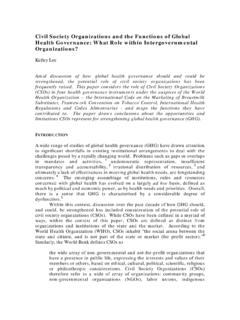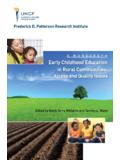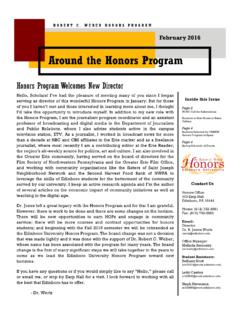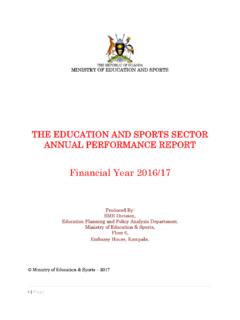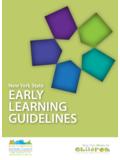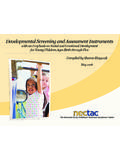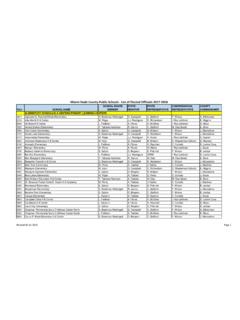Transcription of Autism and Special Education Policy in Mexico - …
1 Autism and Special Education Policy in Mexico John P. Tuman, Danielle Roth-Johnson, Dana Lee Baker, and Jennifer Vecchio In recent years, a great deal of scholarship has examined the adequacy of Special Education and other support services for children with disabilities in the and in other industrialized states. By contrast, there has been comparatively little study of services for children with disabilities in developing countries. In this paper, we attempt to bridge this gap in the literature. Focusing on the case of Mexico , we examine the provision of Special Education and other support services, and the availability and cost of private services.
2 The focus of the analysis is on children with Autism . Drawing upon a theoretical approach that combines modern political economy and comparative institutionalism, we also develop a tentative explanation of the politics of Policy -making among parents and other stakeholders in the Autism advocacy community. INTRODUCTION Since the early 1980s, governments in Latin America have implemented a wide range of social and health Policy reforms. In the aftermath of the 1982 debt crisis, Policy -makers in the region came under strong pressures from the International Monetary Fund and the World Bank to reduce social spending and to redesign social and health programs to be compatible with neoliberal economic In addition to pressures emanating from international economic organizations, transnational Policy networks and politically insulated change teams were also key to promoting social sector Regardless of whether the origins of Policy change were located at the systemic or domestic levels.
3 By the mid-1990s it was plain to most observers that social policies had been radically altered throughout Latin America. Social sector reforms in Latin America have had a profound influence on Education policies in the region. A rich Policy literature has documented effects of various reforms to regular Education , ranging from decentralization plans, performance-based compensation for teachers, and Yet, although the effects of reforms to regular Education have been well studied, analysts have devoted comparatively little attention to recent changes in Special Education Policy in Latin The lack of attention given to Special Education by analysts of comparative health and social Policy is potentially significant.
4 Human rights groups and Policy -makers alike have come to recognize that people with disabilities in Latin America are subject to social exclusion and frequently end up living in In this context, the question of disability6 rights has become increasingly salient in selected countries in Latin America. There is also a strong presumption among regional health organizations that public policies for people with disabilities are not adequate. Indeed, in many cases, Special Education is the only major service provided by the state, and particularly for people with mental TUMAN, ROTH-JOHNSON, BAKER AND VECCHIO, Autism AND Special Education Policy IN Mexico GLOBAL HEALTH GOVERNANCE, VOLUME II, NO.
5 1 (SPRING 2008) 2and neurological differences. Viewed from this angle, the failure to adequately study changes in Special Education creates a large gap in our understanding of how Latin America s new democracies are addressing the needs of differently-abled people. In this paper, we attempt to bridge this gap in the literature by focusing on the provision of public Education policies in Mexico . Among the Latin American countries implementing changes in Special Education Policy , Mexico s experience with reform has been particularly striking. After 1993, the government embraced a Policy of inclusiveness and mainstreaming, to the maximum extent possible, for all children with disabilities.
6 To date, however, only a small number of studies have examined the effects of Mexico s There has been virtually no research on the experience of specific groups of disabled students in Mexico covered by Special Education , including students with A focus on children with Autism can contribute to the comparative analysis of Special Education policies specifically and social sector reform in Latin America more generally. Given the high level of economic integration between the and Mexico , it is possible that the recent surge in media coverage of growth in Autism in the has spilled over into the Mexican media market.
7 If awareness of Autism in Mexico is increasing, then it is possible that parents and advocates are scrutinizing the provision of Special Education policies, with attendant consequences for political organizing in the disability rights A focus on Policy for children with Autism can also contribute to a broader analysis of democratization in Latin America. Although there is some debate in the literature, recent scholarship has asserted that full democracies must provide a minimum of protections and opportunities for groups that are vulnerable to social Because people with Autism experience varying levels of behavior that is socially defined as stereotyped, impaired, or socially challenged, they are at risk for experiencing poverty, social exclusion.
8 And mistreatment via The inability or unwillingness of Policy -makers to provide adequate opportunities for people with Autism and others with disabilities is suggestive of the barriers political regimes face as they attempt to transition from semi-democracies to full-democracies. The analysis employs a case study12 approach that utilizes different types of data. We draw partly on anonymous semi-structured interviews to analyze the effects of reform and the pattern of political activism among disability rights groups. Generated between 1999-2001 and 2006-2007,13 the interviews cover federal and state-level Special Education officials, psychologists and other professionals ( , speech therapists, behavioral intervention consultants), members of advocacy organizations, and other stakeholders in Mexico and the who work in Mexico s disability Policy area.
9 The information gleaned from interviews is augmented by contact with staff from Autism clinics (who have worked in Mexico ) and with analysis of quantitative data on services for children with Autism provided by federal Special Education Although Special Education policies were reformed in the mid-1990s, we restricted the time frame for analysis to 1999 through 2006 in order to allow sufficient lag for the effects of reform policies to have an effect. TUMAN, ROTH-JOHNSON, BAKER AND VECCHIO, Autism AND Special Education Policy IN Mexico GLOBAL HEALTH GOVERNANCE, VOLUME II, NO. 1 (SPRING 2008) 3 The paper is divided into four sections. In the first section, we examine the data on the prevalence of Autism in industrialized countries and in Mexico .
10 The second and third parts examine public Special Education and private programs for children with Autism . Finally, in the fourth section, we examine the politics of policymaking, with a focus on the activities of disability rights and advocacy organizations. Autism IN Mexico : AN OVERVIEW Data from recent studies suggest that prevalence of Autism in industrialized countries may be higher than what had been estimated in previous research. In a review of 16 studies from 1993 to 2003 completed in the , France, Sweden, Norway, Finland, and Japan, Eric Frombonne found that the median estimate of prevalence of Autism and Autism spectrum disorders from these studies was per 1,000 In 2006, the Centers for Disease Control and Prevention (CDC)
